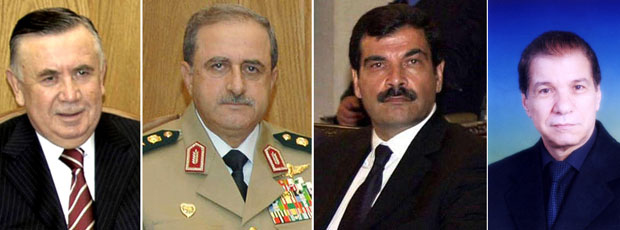 AMID conflicting reports that President Bashar al-Assad had agreed to step down from power — a claim strenuously denied by Syria — it emerged that Wednesday’s bomb attack on the heart of the regime had claimed the head of the country’s security service.
AMID conflicting reports that President Bashar al-Assad had agreed to step down from power — a claim strenuously denied by Syria — it emerged that Wednesday’s bomb attack on the heart of the regime had claimed the head of the country’s security service.
General Hisham Ikhtiyar is the fourth senior Syrian official to die in the blast, while the fate of Interior Minister Mohammed al-Shaar, also wounded in the attack, is unknown.
Russia’s ambassador to France, Alexander Orlov, told French radio that Dr Assad was ready to leave power in an ‘‘orderly way’’, drawing a quick response from the Syrian Information Ministry which dismissed his statement as ‘‘baseless’’.
Mr Orlov told the RFI network that Dr Assad had accepted a final communique on the transition of power in Syria and nominated his representative to lead the negotiations with the opposition for this transition. However, the Russian embassy in Paris said later the ambassador’s comments had been ‘‘taken out of context’’.
Fierce fighting continued, with local activists saying more than 300 people died on Thursday alone and tens of thousands of Syrians had fled to neighbouring Turkey and Lebanon over the past 48 hours.
Rebel fighters gained significant ground, seizing the Syrian side of the Abu Kamal border checkpoint with Iraq, one of the Middle East’s major trade routes, as well as claiming control of two border crossings with Turkey at Bab al-Hawa and Jerablus, Reuters reported.
The fresh rebel gains come as the regime absorbs the psychological impact of the attack that killed Assad’s brother-in-law and deputy head of defence Assef Shawkat, as well as the defence minister Dawoud Rajha, and Assad’s crisis management chief, Hassan Turkmani.

In the meantime, work was continuing behind the scenes to develop a plan for a political transition in Syria, with experts predicting the regime’s collapse could be weeks, or even days, away.
But as yet there is no sign that opposition groups have developed a co-ordinated approach, said Mona Yacoubian, a senior Middle East adviser at the Washington-based Stimson Centre. ‘‘It has been a continual failure on the part of the opposition to unify and the longer this goes on the more difficult it will be to resolve,’’ she said.
Planning for Syria’s ‘‘Day After’’ has included the development of a series of recommendations for whenever a transitional authority assumes power, including security reform, rule of law, transitional justice and economic and social reconstruction. But, Ms Yacoubian said, there was no guarantee there would be support for the transition plan from either opposition groups or on the ground in Syria.
The question of what happens to Syria’s stockpile of chemical weapons is also causing concern in the region. The arsenal is said to include large amounts of sarin, in addition to tabun and mustard gas. Syria was reportedly producing and weaponising the nerve agent known as VX, according to the website GlobalSecurity.org.
Israel is deeply concerned the weapons could fall into the hands of one of its regional enemies.
‘‘Israel will not sit idly by,’’ said Danny Yatom, a former head of the country’s spy agency Mossad. ‘‘If we have information of chemical agents or biological agents are about to fall into the hands of the Hezbollah we will not spare any effort to prevent it,’’ he said.
Brisbane times

Leave a Reply
You must be logged in to post a comment.